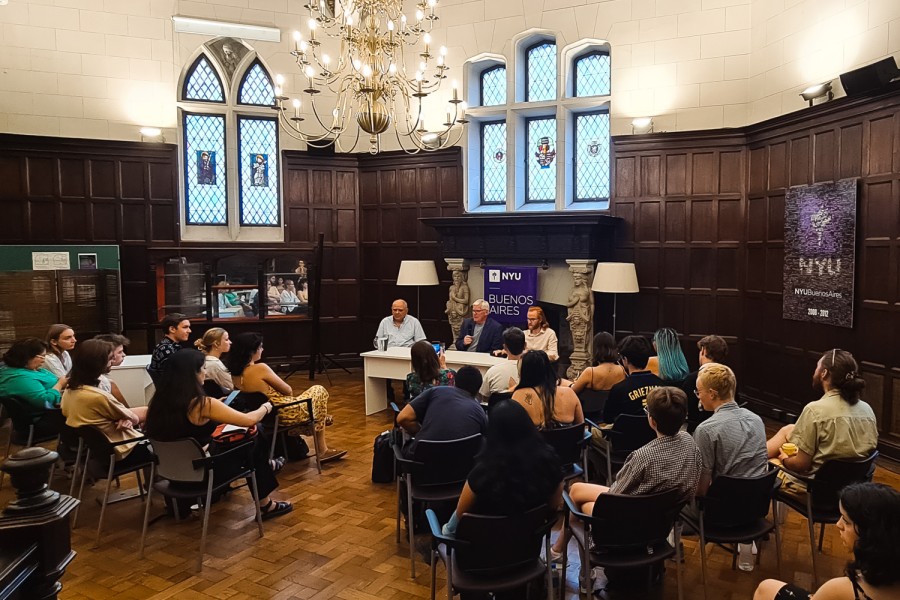WikiLeaks editors talk future of journalism, democracy at NYU Buenos Aires
In light of WikiLeaks founder Julian Assange’s recent extradition trial, two editors of the website joined an NYU professor on Dec. 7 to discuss freedom in journalism.
December 12, 2022
BUENOS AIRES, Argentina — Two editors of Wikileaks, the whistle-blowing website known for publishing troves of confidential documents, spoke at an event hosted by NYU’s study away program in Buenos Aires, calling for the release of Julian Assange, the Wikileaks founder, in the interest of preserving freedom of speech in journalism.
Assange, who is currently being held at a prison in the United Kingdom, is facing charges in the United States for publishing classified government material. A number of heads of state and media institutions have called for the charges against Assange to be dropped.
Kristinn Hrafnsson, the Wikileaks editor-in-chief, and Joseph Farrell, an editor, took part in the event during their tour of Latin America, where they met with the leaders of Colombia, Brazil and Argentina to garner support for Assange. The two were joined by renowned journalist and professor Santiago O’Donnell to discuss the future of journalists’ rights.
“It is a great opportunity to speak directly to the future of journalism,” Hrafnsson said. “We are trying to change things and we will now try to radicalize you as much as possible. When I say radicalize, it is actually a term that is close to the truth — because the truth of the matter is that telling the truth is a revolutionary act these days.”
London’s High Court will hear Assange’s final appeal to the court in regard to the United States’ request for his extradition. Assange faces 17 charges under the Espionage Act and a sentence of up to 175 years in prison for allegedly leaking U.S. diplomatic documents in 2010 and 2011, which became known as Cablegate.
According to Hrafnsson and Farrell, if Assange is extradited, it will set the precedent for other journalists to be tried for publishing. Five news publications, including The New York Times and The Guardian, have also called for the U.S. to drop the charges against Assange, claiming that they pose a threat to press freedom.
“What we need now, urgently, is a coordinated response in our fight for [Assange’s] freedom and all the inherent values that are lying there underneath,” Hrafnsson said. “I simply call it the fight for civilization. I simply call this a fight for democracy.”
Prior to their arrival in Argentina, the WikiLeaks editors met with the first left-wing Colombian president, Gustavo Petro, Brazilian President-elect Luiz Inácio Lula da Silva and Argentinian President Alberto Fernández, all of whom oppose Assange’s extradition.
Australian Prime Minister Anthony Albanese recently called for the United States to drop charges against Assange. Five media outlets that collaborated with WikiLeaks on Cablegate, the leaking of thousands of communications to the U.S. State Department in 2010, published an open letter on Nov. 28 in support of Assange.
“We spend a lot of time talking about [Assange], but I just want you to remember, he’s just the placeholder, he is the poster boy for this persecution,” Farrell said. “Fundamentally, it is about your right to know. Your right to know is inherently linked to democracy.”
In 2011, O’Donnell, the NYU Buenos Aires professor, met with Assange in England, where he was given access to communications from the U.S. embassy in Buenos Aires. He was the first to break many of the leaked messages in his book, titled “Argenleaks.” He currently teaches two classes at NYU’s Buenos Aires study away site — “Journalism and Society: Leaks and Whistleblowers” during the fall and “Reporting Buenos Aires” in the spring. He has reported for The Washington Post and the Los Angeles Times, and is currently an editor at Página 12, a newspaper in Buenos Aires.
“People are being persecuted for telling the truth as journalists,” Hrafnsson said. “If somebody tells you, ‘You should not be an activist, you should be a journalist,’ tell them, ‘I need to be an activist to fight for the right to be a journalist.’”
The lecture series at NYU Buenos Aires provides students with perspectives of professionals in fields that coincide with their coursework. During the lecture, journalism students were given the opportunity to engage with editors and learn about their defense of free speech and democracy.
“NYU is a university that extends enormous, privileged opportunities to students, and the same occurs in the global sites, but there are few occasions that are quite this dramatic,” Anna Kazumi Stahl, NYU Buenos Aires site director, said.
Contact Benjamin Galloway at [email protected].
























































































































































